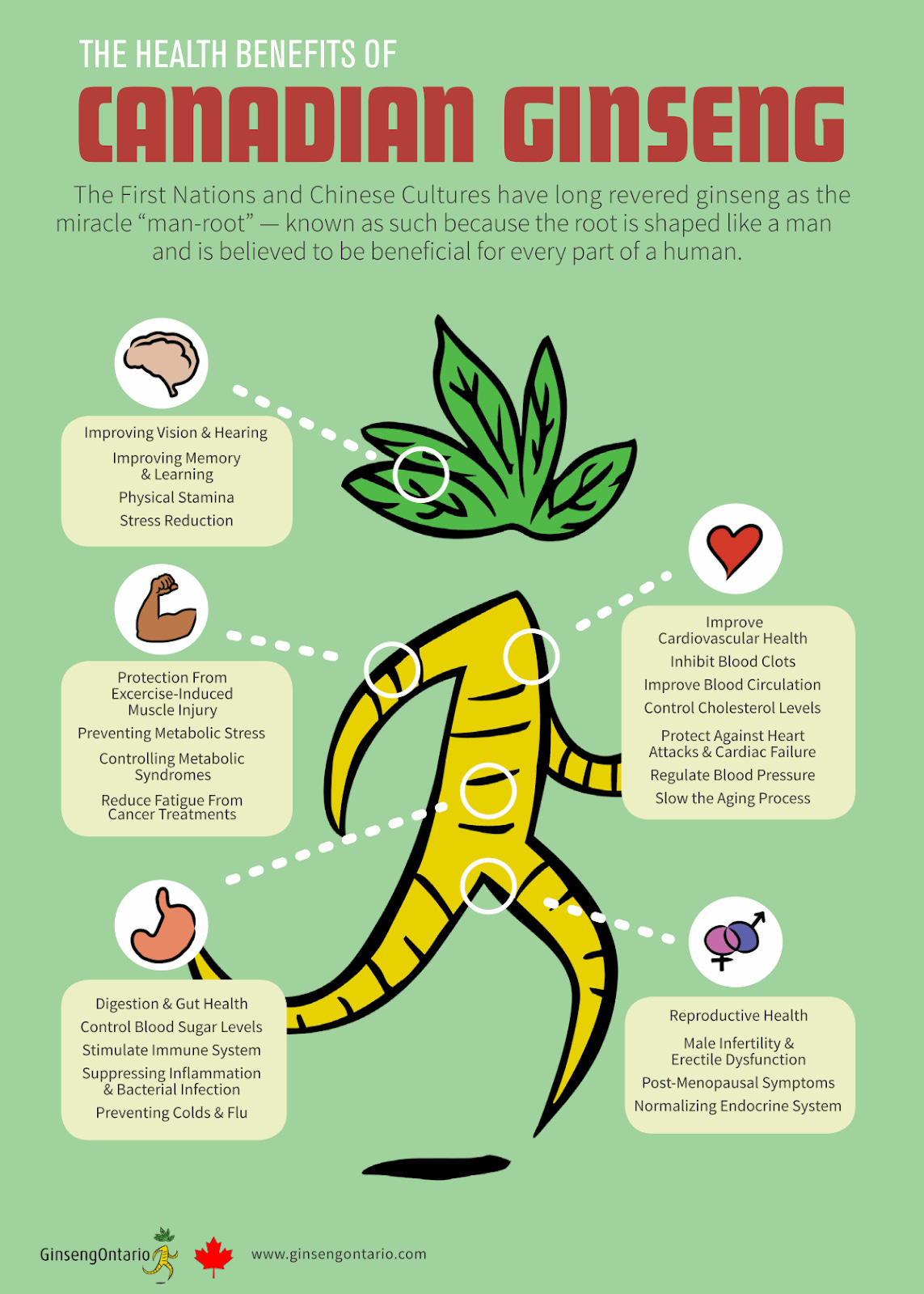The Medical Benefits of Ginseng
Written by Aarushi Rai
Ginseng is a Chinese herb that is commonly used in Asia, but you’ve likely heard about it being used as medicine to improve health. In recent years, it has gained popularity, and rightfully so. Ginseng can provide numerous medical benefits to a person’s wellbeing.
There are two types of Ginseng: American Ginseng and Asian Ginseng (which tends to be stronger than its American counterpart). In Traditional Chinese Medicine, it is used as a complementary herb, though not to replace any other medicine. Asian Ginseng offers a boost, meaning that it tonifies (in the sense of one’s life force energy, in reference to TCM) vital organs. In contrast, American Ginseng tends to have a calming effect, more nourishing and relaxing. It can also help with cognitive functions such as thinking and reasoning.
Both types of ginseng have had studies done to show that they boost alertness and brain function. For example, a study done on American Ginseng to study its effects on neurocognitive function found that “there was a significant improvement of working memory (WM) performance associated” (A. Scholey, et. al). Another quality of ginseng may be that it improves heart health and circulation, though not enough research yet has confirmed it strongly. A study done in 2021 discussed the effects of Chinese herbal medicine on Aplastic Anemia patients and found that for them, ginseng extract promoted the proliferation and differentiation of hematopoietic progenitor cells and helped regulate its immune function (M. Chiu, et. al).
In TCM, ginseng has been tied to improved spleen, stomach, and digestion function. There may also be evidence for ginseng helping regulate blood sugar, though studies done on diabetics have shown mixed results. Perhaps the strongest benefit that ginseng provides is that it helps immune function. Research has shown that taking both American ginseng or Asian ginseng has helped reduce the chance of getting a cold, and separately, tonify the lungs to help them get stronger.
Lastly, Asian ginseng is commonly believed to increase energy levels, while American ginseng has had studies done that shows it has helped fight fatigue. Research done on American ginseng’s effect on Cancer-Related Fatigue suggested that taking 2000 milligrams of the herb everyday has improved CRF symptoms with minimal side effects (E. A. Lemke).
Despite all the benefits, certain groups need to be cautious of their ginseng intake levels, particularly those with high blood pressure, diabetes, taking blood thinners or stimulants or supplements, and more. There are some side effects of ginseng that can be very harmful to people falling in these groups, such as dizziness and headache, lower blood sugar, menstrual changes, etc.
In conclusion, ginseng’s medical benefits should not be ignored. It provides many positives as a supplement and if you are looking for a natural way to increase your health through your diet, ginseng may be just what you are looking for.
REFERENCES:
“Can Ginseng Boost Your Health?” Cleveland Clinic, health.clevelandclinic.org/ginseng-benefits.
Scholey, Andrew, et al. “Effects of American Ginseng (Panax Quinquefolius) on Neurocognitive Function: An Acute, Randomised, Double-Blind, Placebo-Controlled, Crossover Study.” Psychopharmacology, vol. 212, no. 3, 31 July 2010, pp. 345–356, www.ncbi.nlm.nih.gov/pmc/articles/PMC2952762/, https://doi.org/10.1007/s00213-010-1964-y.
“Frontiers | Chinese Herbal Medicine Therapy Reduces the Risks of Overall and Anemia-Related Mortalities in Patients With Aplastic Anemia: A Nationwide Retrospective Study in Taiwan” Chinese Herbal Medicine Therapy Reduces the Risks , www.frontiersin.org/journals/pharmacology/articles/10.3389/fphar.2021.730776/full. Accessed 20 July 2024.
A. Lemke, DNP, AGPCNP-BC, AOCNP, Emily. “Ginseng for the Management of Cancer-Related Fatigue: An Integrative Review.” Journal of the Advanced Practitioner in Oncology, vol. 12, no. 4, 1 May 2021, https://doi.org/10.6004/jadpro.2021.12.4.5.
“Health Benefits.” Ontario Ginseng Growers Association, ginsengontario.com/about/health-benefits/. Accessed 20 July 2024.


